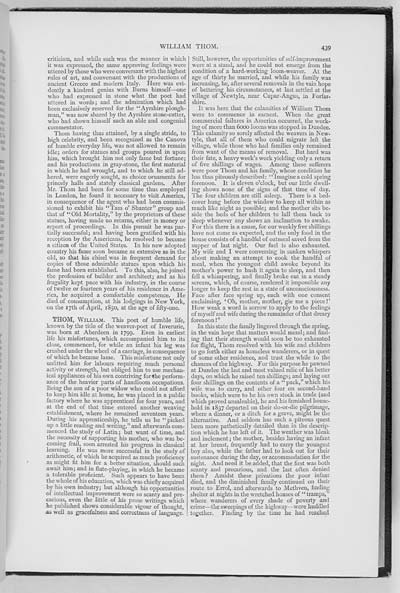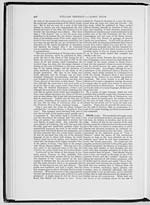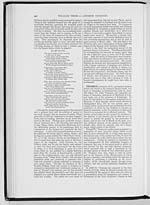Volume 3 > Half-Volume 6
(85) Page 439 - Thom, William
Download files
Individual page:
Thumbnail gallery: Grid view | List view

439 criticism, and while such was the manner in which it was expressed, the same approving feelings were uttered by those who were conversant with the highest rules of art, and conversant with the productions of ancient Greece and modern Italy. Here was evi- dently a kindred genius with Burns himself�one who had expressed in stone what the poet had uttered in words; and the admiration which had been exclusively reserved for the "Ayrshire plough- man," was now shared by the Ayrshire stone-cutter, who had shown himself such an able and congenial commentator. Thorn having thus attained, by a single stride, to high celebrity, and been recognized as the Canova of humble everyday life, was not allowed to remain idle; orders for statues and groups poured in upon him, which brought him not only fame but fortune; and his productions in gray-stone, the first material in which he had wrought, and to which he still ad- hered, were eagerly sought, as choice ornaments for princely halls and stately classical gardens. After Mr. Thorn had been for some time thus employed in London, he found it necessary to visit America, in consequence of the agent who had been commis- sioned to exhibit his "Tarn o' Shanter" group and that of "Old Mortality," by the proprietors of these statues, having made no returns, either in money or report of proceedings. In this pursuit he was par- tially successful; and having been gratified with his reception by the Americans, he resolved to become a citizen of the United States. In his new adopted country his fame soon became as extensive as in the old, so that his chisel was in frequent demand for copies of those admirable statues upon which his fame had been established. To this, also, he joined the profession of builder and architect; and as his frugality kept pace with his industry, in the course of twelve or fourteen years of his residence in Ame- rica, he acquired a comfortable competence. He died of consumption, at his lodgings in New York, on the 17th of April, 1850, at the age of fifty-one. THOM, WILLIAM. This poet of humble life, known by the title of the weaver-poet of Inverurie, was born at Aberdeen in 1799. Even in earliest life his misfortunes, which accompanied him to its close, commenced, for while an infant his leg was crushed under the wheel of a carriage, in consequence of which he became lame. This misfortune not only unfitted him for labours requiring much personal activity or strength, but obliged him to use mechan- ical appliances of his own contriving for the perform- ance of the heavier parts of handloom occupations. Being the son of a poor widow who could not afford to keep him idle at home, he was placed in a public factory where he was apprenticed for four years, and at the end of that time entered another weaving establishment, where he remained seventeen years. During his apprenticeship, he tells us he "picked up a little reading and writing," and afterwards com- menced the study of Latin; but want of time, and the necessity of supporting his mother, who was be- coming frail, soon arrested his progress in classical learning. He was more successful in the study of arithmetic, of which he acquired as much proficiency as might fit him for a better situation, should such await him; and in flute-playing, in which he became a tolerable proficient. Such appears to have been the whole of his education, which was chiefly acquired by his own industry; but although his opportunities of intellectual improvement were so scanty and pre- carious, even the little of his prose writings which he published shows considerable vigour of thought, as well as gracefulness and correctness of language. Still, however, the opportunities of self-improvement were at a stand, and he could not emerge from the condition of a hard-working loom-weaver. At the age of thirty he married, and while his family was increasing, he, after several removals in the vain hope of bettering his circumstances, at last settled at the village of Newtyle, near Cupar-Angus, in Forfar- shire. It was here that the calamities of William Thorn were to commence in earnest. When the great commercial failures in America occurred, the work- ing of more than 6000 looms was stopped in Dundee. This calamity so sorely affected the weavers in New- tyle, that all of them who could migrate left the village, while those who had families only remained from want of the means of removal. But hard was their fate, a heavy week's work yielding only a return of five shillings of wages. Among these sufferers were poor Thorn and his family, whose condition he has thus piteously described: "Imagine a cold spring forenoon. It is eleven o'clock, but our little dwell- ing shows none of the signs of that tune of day. The four children are still asleep. There is a bed- cover hung before the window to keep all within as much like night as possible; and the mother sits be- side the beds of her children to lull them back to sleep whenever any shows an inclination to awake. For this there is a cause, for our weekly five shillings have not come as expected, and the only food in the house consists of a handful of oatmeal saved from the supper of last night. Our fuel is also exhausted. My wife and I were conversing in sunken whispers about making an attempt to cook the handful of meal, when the youngest child awoke beyond its mother's power to hush it again to sleep, and then fell a whimpering, and finally broke out in a steady scream, which, of course, rendered it impossible any longer to keep the rest in a state of unconsciousness. Face after face spring up, each with one consent exclaiming, 'Oh, mother, mother, gie me a piece!' How weak a word is sorrow to apply to the feelings of myself and wife during the remainder of that dreary forenoon!" In this state the family lingered through the spring, in the vain hope that matters would mend; and find- ing that their strength would soon be too exhausted for flight, Thorn resolved with his wife and children to go forth either as homeless wanderers, or in quest of some other residence, and trust the while to the chances of the highway. For this purpose he pawned at Dundee the last and most valued relic of his better days, on which he raised ten shillings; and laying out four shillings on the contents of a "pack," which his wife was to carry, and other four on second-hand books, which were to be his own stock in trade (and which proved unsaleable), he and his famished house- hold in 1837 departed on their do-or-die pilgrimage, where a dinner, or a ditch for a grave, might be the alternative. And seldom has such a piteous quest been more pathetically detailed than in the descrip- tion which he has left of it. The weather was bleak and inclement; the mother, besides having an infant at her breast, frequently had to carry the youngest boy also, while the father had to look out for their sustenance during the day, or accommodation for the night. And need it be added, that the first was both scanty and precarious, and the last often denied them? Amidst these privations the poor infant died, and the diminished family continued on their route to Errol, and afterwards to Methven, finding shelter at nights in the wretched houses of "tramps," where wanderers of every shade of poverty and crime�the sweepings of the highway�were huddled together. Finding by the time he had reached
Set display mode to:
![]() Universal Viewer |
Universal Viewer | ![]() Mirador |
Large image | Transcription
Mirador |
Large image | Transcription
Images and transcriptions on this page, including medium image downloads, may be used under the Creative Commons Attribution 4.0 International Licence unless otherwise stated. ![]()
| Biographical dictionary of eminent Scotsmen > Volume 3 > Half-Volume 6 > (85) Page 439 - Thom, William |
|---|
| Permanent URL | https://digital.nls.uk/74514444 |
|---|---|
| Attribution and copyright: |
|
| Description | Volume III. Contains names alphabetically from Macadam to Young. |
|---|

